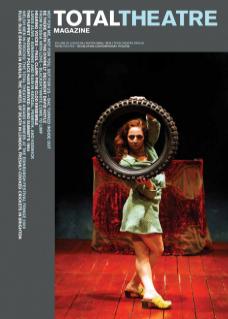How’s it going? What’s the devising/creating story? Are you working as you always do, or is there anything different or specific to this process?
We are working as we always do – turning up, getting a few people along, scratching our heads, doing some stuff, trying to work out what we did...
There is a script. There are puppets made of cardboard. There is a brilliant cast of seven actors. There is no projection...
The best thing about making a show is working with other people. Bringing many people together and trying to get them into a single shape where all their individual voices can still be heard. It’s all about the people.
I guess the big departure for us is to have a fairly full-length script before we start. We have written it over the past year mainly, but we began almost three years ago! Essentially we have been devising and writing with a small, varying company during the year. We have done a few Scratch showings, writing and rewriting, to find a premise that can tell the story.
The challenge in adapting a novel (in this case, George Orwell’s classic, 1984) to stage is that you lose the author’s voice – which is a prime relationship to the work as a reader. In a play the characters tell the story. The premise for our adaptation is that the company are an agitprop company in the ‘1984’ of the novel who are telling the story for the audience as a lesson in thought-crime.
Tell us about your YouTube Scratch idea…
At the moment it is very much an experiment. The viewing figures are so small I guess I should call it a hobby really. The idea came about from a frustration of making and seeing YouTube trailers for theatre which are like film trailers, which I think is ridiculous. Theatre is not film because it is interactive, unfinished and messy. That feels like a perfect fit with YouTube. The good thing about YouTube is that people can write comments and we wanted to start a dialogue. The bad thing about YouTube is that you look at the number of viewers and realise no-one really watches puppet videos when they can watch two girls and a cup.
Anything you want to say about BAC and your relationship with them?
We are in a long-term relationship with BAC and we love the place. We grew up there and have continued making small pieces with them, for example Odde Angel in Punchdrunk’s Masque of the Red Death, and a small Scratch piece in the main hall last year. It feels like home. Low Life was made there and we have re-rehearsed there many times. The set was basically made up of furniture we borrowed from the cafe each time we went out on the road.
As for if and how they are changing – I don’t really know, but I am sure they are – I am still infuriated and excited by ideas I hear there, they still shock me with their outrageousness on occasion and their conservatism on others ... it all feels very familiar really!
Mark Down is an actor, puppeteer, and director. He and designer and puppet-maker Nick Barnes are co-founders and co-artistic directors of Blind Summit Theatre. Blind Summit’s 1984 is at BAC 2–23 December 2009 & 4–9 January 2010. See www.bac.org.uk Blind Summit will be running a Puppetry Skills Workshop Monday 7 December, 10am-1.30pm @ BAC, London The workshop provides hands on experience of basic puppet skills such as focus, fixed point and breath, manipulating objects and working with 3-man operated puppets. Places are strictly limited and cost £25 (+VAT). Included in the price is a ticket to watch the matinee performance of 1984 on the 7th December. For more information or to book your place, please contact Helen Hodge at helen@blindsummit.com or 020 7272 9020. For more on Blind Summit Theatre, see www.blindsumit.co.uk

